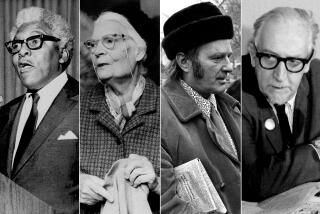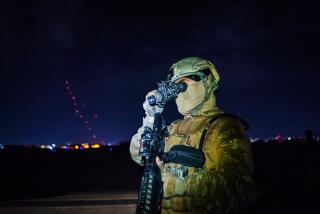Patience and Prudence for President : LOOKING FORWARD by George Bush with Victor Gold (Doubleday: $18.95; 270 pp., illustrated)
The campaign biography/autobiography is a uniquely American creation, a throwaway advertisement for political shoppers, its ultimate destination the remainder table or the yard sale. But donât dismiss it as sheer blarney. The pitch being made, the mixture of fact and fancy, high-lighting and omission, all suggest how Candidate X or Y hopes to be perceived--and admired.
If so, then George Bush and Victor Gold (a well-known Washington political writer) havenât helped their cause. This bland, episodic, straight-arrow book portrays Bush as a regular guy, a âMr. Smith Goes to Washington,â by veneering his upper-class background with a populist, Texas overlay of oil fields and Tex-Mex food.
It doesnât work. Bush is not just plain folks, and it is absurd to cast him so wildly against type. âLooking Forwardâ presents him as loyal, rational, reasonable, every motherâs most reliable son-in-law. Of imagination, there is none, of originality, no spark. And why should there be? Working hard within the system has already brought Bush a heartbeat away from the Oval Office. Once upon a time, this outlook might have satisfied a nation content with good administration rather than dynamic leadership. But now. . . ?
Bush remains an Establishment offspring, of elite family and education, his self-confidence tempered by modesty, his ambition by good form. He comes from a large, wealthy, hard-working Connecticut, i.e., suburban New York, family. His father, Prescott Bush, had moved East from Ohio to build a very successful career, first as a Wall Street banker, and then as a moderate Republican senator during the Eisenhower presidency.
Bush, always in a hurry, did all the right things early on. He went straight from a New England prep school to a carrier deck in the Pacific. (His father had fought in World War I.) As the youngest pilot in the Navy, Bush flew bombers against Japanese-held islands in 1943-â44; he flew 58 combat missions, was shot down twice and rescued twice. He seems to have put it all behind him, offering no hint about its effect--if any--on his thinking or outlook.
Bush met his wife at 17, married at 20, and raced through Yale--his fatherâs school--as a war veteran. Of ideas, courses, teachers, he says nothing (actually, he was a Phi Beta Kappa); of his college baseball career, far too much. A stray remark suggests a road not taken. Bush was urged to apply for a Rhodes scholarship. He decided not to: With a wife and child to support after three lost years at war, entering âthe real worldâ of business was far more important.
That meant West Texas, where insiders saw big bucks to be made. This Bush did, starting at the bottom in dusty oil towns, gaining experience in an established company before joining other ambitious young men in snapping up hot properties and going on their own. This could be a classic American story of risk, grit, and drive, but Bush skims right over it, barely touching both the wheeling and dealing, and also the struggles of a Yalie making good in the outback. Even the lingering death of his young daughter from leukemia in 1953 is handled briskly, almost impersonally. As Bush says about suffering briefly from a bleeding ulcer: âAll my life Iâd worked at channeling my emotions, trying not to let anger or frustration influence my thinking.â
Bushâs national career began with his election to Congress from Houston in 1966. The upward moves continued (the Bush family moved 28 times in 40 years), with short-lived stops to bolster his experience--and his resume: Bushâs trump card is expertise, not policy. After four years in Congress, there were two as ambassador to the United Nations, 1 1/2 as chairman of the Republican National Committee, and 13 months each as head of the Liaison office in China, and as CIA director.
Again, Bush tells us virtually nothing of events, but it is clear that his upbringing enabled him to fit gracefully into institutions, to adjust to their dynamics and to the personal relationships that grease the wheels. So he performed ably, treating each new job as a challenge, learning quickly from his subordinates, and faithfully carrying out his instructions from above. At the United Nations, he reached out even to the smallest Third World country; at the National Committee, he performed faithfully through the worst of Watergate; at the CIA, he tried to improve relations with Congress and the morale of a demoralized staff; and in China, he managed to get along with Henry Kissinger while also tightly raising the very low profile of the American presence.
But are competence, experience, and prudence sufficient for a President? Bush tells two stories that suggest an answer. While serving in China during 1975, Bush joined Kissinger in a fascinating conversation with Mao Zedong, then 81, and very ill. Mao invited Bush to return. Bush was interested, but chose to consult his staff, who advised against it: Mao was just being diplomatic, they argued. Mao later died. Bush spoke of the invitation to a Chinese official who regretted Bushâs caution: âThe Chairman would never have made such an invitation unless he meant it.â
In 1953, Bush and his business friends in Texas needed a name for their new oil company, a name that would stand out in the phone book. They chose Zapata, after âViva Zapata,â the Marlon Brando film then playing, about the charismatic peasant Mexican leader of the 1911 Revolution. Bush may have seen the film, but he didnât grasp the point: Zapata loathed everything that prudent businessmen represented.
More to Read
Sign up for our Book Club newsletter
Get the latest news, events and more from the Los Angeles Times Book Club, and help us get L.A. reading and talking.
You may occasionally receive promotional content from the Los Angeles Times.






